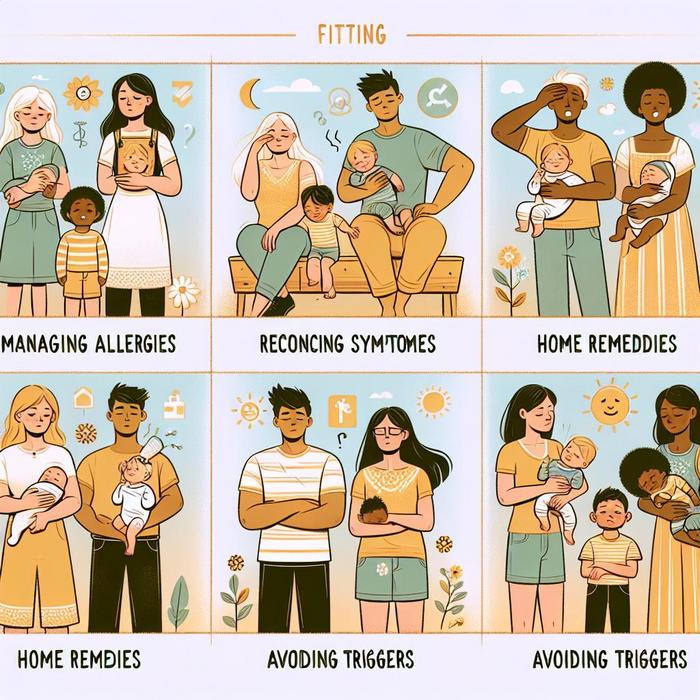Recognizing Symptoms of Baby Allergies
Recognizing the symptoms of allergies in babies can be quite challenging due to their inability to communicate their discomfort verbally. However, by closely paying attention to changes in your baby’s behavior and visible signs of discomfort, you can effectively identify if your baby might be suffering from allergies.
The most common symptom of allergies in babies includes skin conditions such as eczema, which can appear as dry, red, and itchy patches on the baby’s skin. Other symptoms may include digestive difficulties such as diarrhea, vomiting, or constipation, respiratory issues like coughing or wheezing, and general irritability. These symptoms can occur after feeding or upon exposure to specific allergens present in the environment.
Here is a comprehensive resource to help you understand the symptoms of allergies in babies in detail.
Managing Baby Allergies
Once you recognize the signs of allergies in your baby, it’s crucial to take steps towards managing baby allergies. This can be done through medical interventions, dietary adjustments, and careful avoidance of allergens.
- Medical Interventions: For skin-based allergic reactions like eczema, you might need to consider consulting a pediatric dermatologist. Here is the link to a resource that explains the management of severe refractory atopic dermatitis in children.
- Dietary Adjustments: If your baby shows allergic reactions to certain food items, it’s crucial to modify their diet accordingly. Please refer to our post on introducing solids while continuing breastfeeding. An elimination diet may be necessary for severe cases. Always consult your pediatrician before making significant dietary changes. Also, taking precautions while introducing new foods to your baby’s diet can significantly help in managing baby allergies. For more insights on this, here is a source from the CDC.
- Avoidance of Allergens: Allergies can also be triggered by airborne allergens or substances your baby comes in contact with. These can include pollen, dust mites, animal fur, or certain fabrics. Thus, creating an environment free from these allergens can substantially help in managing baby allergies.
Home Remedies for Baby Allergies
There are specific home remedies that can help soothe your baby’s allergy symptoms and offer them relief. For skin allergies, a soothing bath with mild skin-friendly ingredients can be beneficial. On the other hand, for digestive issues, probiotics and ginger can aid digestion and alleviate discomfort.
Remember always to consult with your baby’s healthcare provider before introducing any new remedy into their regimen. It’s vital to ensure that the remedy is safe and suitable for your baby’s age and overall health. Our post on choosing safe baby products can provide more insights into this.
How We Managed Baby’s Allergies: Tips and Remedies That Worked for Us
Recognizing Food Allergies in Babies
Food allergies are one of the most common types of allergies that can occur in babies. The symptoms can range significantly and can manifest as skin, digestive, or respiratory problems. According to the ACAAI, common foods that might cause allergies in babies include cow’s milk, eggs, peanuts, tree nuts, soy, wheat, and fish.
A baby with a food allergy will likely show symptoms within a few minutes to an hour after eating the allergenic food. These can include a rash around the mouth or on the body, breathing difficulties, vomiting, diarrhea, or anaphylaxis in severe cases. If your baby shows any of these symptoms, it’s crucial to seek immediate medical attention.
Understanding Your Baby’s Allergy Risk
While any baby could potentially develop allergies, certain factors can increase a baby’s risk of allergies. The hereditary factor plays a significant role in the occurrence of allergies. If one parent has allergies, a baby’s risk of allergies increases, and if both parents have allergies, that risk is even higher. According to ACAAI, the child has approximately a 75% chance of developing allergies if both parents have allergies.
Premature or low-birth-weight babies may also have an increased risk of developing allergies. Babies with a personal history of asthma or atopic dermatitis, or those living in households with smokers, can also be at higher risk.
When to Consult a Professional
If your baby is experiencing symptoms that suggest an allergic reaction, it’s essential to consult a pediatrician or an allergy specialist immediately. The healthcare provider will do a thorough examination, consider the baby’s medical history, and, if necessary, perform allergy testing to determine the cause of the allergic reaction.
Keep in mind, ongoing research is continually improving our understanding of allergies in babies. For example, studies such as those found on NCBI and PMC 8236874, provide new insights into the genetic and environmental factors that influence the development of allergies in babies.
Preventing Baby Allergies
While not all allergies can be prevented, taking certain steps can potentially reduce your baby’s risk of developing allergies. Breastfeeding your baby exclusively for the first four to six months, for instance, can help strengthen your baby’s immune system and decrease the risk of allergies. Introducing solid foods gradually and at an appropriate age may also help prevent food-related allergies.
Raising your baby in a smoke-free environment, maintaining a clean home to reduce exposure to pollutants, and vaccinating your baby as per the recommended schedule can all play a part in allergy prevention.
Although it might seem daunting at first, managing baby allergies becomes more manageable with time, understanding, and appropriate guidance. Be sure to remain in close contact with your healthcare provider and follow the advice provided to help your baby live comfortably and healthily.
